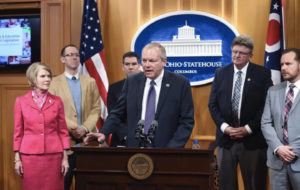Massive Alaska school spending bill tabled for now
(The Center Square) – State Rep. Dan Ortiz took a “loud and clear” stance this week on substantially raising Alaska’s base student allocation at the House Education Committee’s second reading for…

(The Center Square) – State Rep. Dan Ortiz took a “loud and clear” stance this week on substantially raising Alaska’s base student allocation at the House Education Committee’s second reading for the bill he sponsored to address the state’s school funding issues.
The former-educator-turned-Independent legislator from Ketchikan pressed his constituents Tuesday to take swift action on progressing House Bill 65 – or potentially risk seeing Alaskan public schools cut educational programs and eliminate jobs for their teachers and staff.
Ortiz’s HB65 is the largest proposal in the legislative session for hiking the state’s per-student formula funding provided to school districts statewide each year. The prospective measure seeks to increase the per-student amount to $7,210, a significant increase over next year’s scheduled per-pupil increase to $5,960. The current allocation of $5,930 per student has not been increased since 2017.
“I know, members of the committee, that all of us in the legislature have been hearing loud and clear about the difficult decisions school districts across the state are facing in terms of what programs and numbers of staff will need to be cut if we in the legislature are unable to reach a consensus on the need to provide a significant increase the BSA,” said Ortiz during the committee meeting.
During his presentation on HB65, Ortiz told the committee that state spending for Fiscal Year 2022, if adjusted for inflation, would be the lowest it has been in 20 years. Money from the state, he added, was a primary source of funding revenue for most of the Alaska school districts.
Questioning by committee members followed Ortiz’s initial presentation. Committee Co-chair Republican Rep. Jamie Allard of Eagle River asked Ortiz as to why school districts were cutting teachers and programs rather than shuttering school buildings. Allard noted $40 million in facilities could be liquidated to ease rising costs.
“Rep. Ortiz, one of the very first things you said in the comments was that we’re going to have to cut teachers, and that seems like the narrative. If we say that, it alerts the public and it’s alarming because we have so many buildings that could be closed down to save money there first,” said Allard. “Why do you go towards ‘let’s cut the teachers,’ and what guarantee do we have that the funds are going to stay in the classroom?”
Ortiz said 80% of school budgets go towards total compensation packages for their staff, and districts need to remain competitive in their salary offerings to retain their teachers. He said school districts, including those that Ortiz represents, are already looking to close schools to make ends meet.
“If you shut down the schools in some of the communities that I represent, nobody goes to school. Period,” Democratic Rep. C.J. McCormick of Bethel added.
Committee Co-Chair and Republican Rep. Justin Ruffridge of Soldotna shared that schools in his district were also struggling financially, too. He said the Kenai Peninsula School Board faced a $13 million deficit for their upcoming year and had to dip into their savings to try and cover costs, according to Ruffridge.
Even with reserves, the district has fallen $3 million short of what it is needed to maintain, he added.
Ruffridge said Kenai Peninsula Schools are looking to up the pupil-to-teacher ratios by 3-to-4.5 students in classrooms as well as cutting staff. “They’re projecting to remove the managers of every pool, and I don’t need to remind this committee that the Kenai Peninsula School District pools produced an Olympic gold medalist…as well as all the technicians for our theaters and all of the authentic director positions,” said Ruffridge. “It definitely paints a picture for at least my school district, and while I can’t speak for any others, the process [of cutting] is a difficult one.”
Tuesday’s nearly hour-long committee deliberation on HB 65 concluded with the bill being tabled for a later date, but Ruffridge told the committee and Ortiz that a hearing to listen to public testimony on the bill will be set “soon” and is the next step in the bill’s progress.



